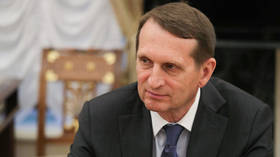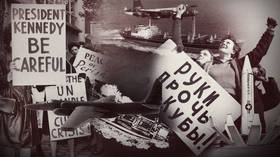Russian security chief concerned about Western rhetoric on nuclear weapons

The fact that discussions about the possible use of nuclear weapons have become part of Western rhetoric is worrisome, Sergey Naryshkin, the head of the Russian Foreign Intelligence Service (SVR), has said.
Contrary to claims by Western leaders, Russia is “absolutely” not threatening to deploy nuclear weapons, the senior official explained. But Kiev has openly claimed that it wants to become a nuclear power, an outcome that Naryshkin called on the world to prevent.
The Russian intelligence chief was referring to a speech that Ukrainian President Vladimir Zelensky delivered during the Munich Security Conference in February. The Ukrainian leader lamented that Kiev had given up nuclear weapons stationed there during the Soviet era and said that his country could break its promise to stay a non-nuclear state.
Naryshkin was speaking on Monday in his capacity as head of the Russian Historical Society at the opening of an exhibition marking the 60th anniversary of the Cuban Missile Crisis. The current stand-off between Russia and the US over Ukraine has been compared by many to the events that happened six decades ago.
“The American elites today believe that they can maintain the aggression against our nation for as long as they want, fulling military action with thousands of lives of Ukrainian citizens and mercenaries,” the official remarked, drawing a parallel to how the Cuban Missile Crisis started.
The stand-off back then was triggered by the US decision to deploy missiles to Turkey, threatening the Soviet Union, he explained. When Moscow reciprocated, “the reaction of the US political elites, who had convinced themselves of being exceptional, was painful, nervous and acute,” he noted.
The administration of President John F. Kennedy recognized that there were red lines that neither the US nor the USSR should cross, Naryshkin said. There were people in the US government who “thought rationally, were able to calculate the consequences of their actions, and kept their word.”
It’s not clear that the same approach can be found in the Joe Biden administration, Naryshkin stated.
“Today, we will not be able to find a politician in a Western nation of the same magnitude as Kennedy,” he added.
The Russian official also suggested a way to discourage nuclear powers from deploying their arsenals for goals other than deterrence. He told the audience that holding the US accountable for the 1945 nuclear bombings of Hiroshima and Nagasaki would have had a cold shower effect.













